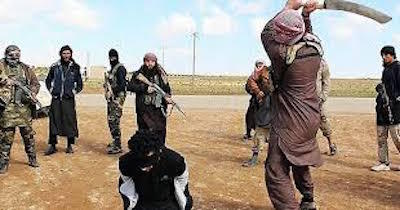If we don't understand what makes ISIS tick we'll never be able to defeat it. To view ISIS as simply a determined army of vicious psychopaths is a significant mistake. ISIS is far more complicated than that, in its origins, philosophy and strategies.
ISIS is an ultra-puritanical interpretation of Islam that traces its roots back 1300 years to early decades of the religion, when the prophet Muhammad and a small band of followers were surrounded by enemies and fighting for their lives on the Arabian Peninsula. Muhammad and his lieutenants we're skilled, fierce and intolerant warriors; the verses of the Koran written down in this period (and used by ISIS today to justify it actions) are from this period of puritanical bloodiness.
ISIS is not making up or misquoting the Koranic verses it cites, nor is it misreading a bloody period in the history of Islam. The uncompromising interpretation of the Koran that drives ISIS has always been part of Islam even as mainstream Islamic scholars (and most Muslims) have rejected it. These scholars stress instead Koranic verses urging peace and tolerance, verses handed down, Muslims believe, to Muhammad by God in more peaceful times before the nascent religion drew sufficient notice to create enemies determined to destroy it, and the Prophet was forced to become a warrior-king.
In short, ISIS has cherry-picked both the holy texts and Muhammad's biography to support its philosophy and actions. It's as if a small group of Christians or Jews decided to practice a religion based only on the most violent and intolerant parts of the Old Testament.
ISIS draws its most immediate inspiration from Wahhabism, a messianic, radical form of Islam that arose in the 18th century, hoping to restore a fantasized Caliphate centered on a desert, a sacred book, and two holy sites, Mecca and Medina. Wahhabism continues to have significant influence in the Islamic world, especially in Saudi Arabia where it exists in an uncomfortable alliance with the kingdom's more secular rulers.
Following the Wahhabists, the ideology of ISIS, is in large part, based on three absolute rejections:
• The rejection of the modern Islamic tradition of tolerance for Christians and Jews (the "people of the book"). Christians under ISIS rule are forced to convert to Islam or pay a tax in order to escape death.• The rejection of secular ideologies. Democracy is particularly despised because it allows people to shape policies and pass laws, ignoring the "unalterable" laws codified in Islamic Sharia law. • The rejection of what are labelled "diluted" forms of Islam. For instance, Muslims who claim Islam is a religion of peace are not considered truly Muslim. For ISIS, Islam will only be a religion of peace after it has taken control of the world.
Is ISIS al Qaeda? Yes and no. The two groups share inspiration from more or less the same interpretation of the Koran and from Wahhabi Islam. Both employ indiscriminate violence as a major tactic. What is today ISIS operated as an Al Qaeda affiliate in Iraq for years until it split from its parent when the Syrian internal war broke out in 2013.
Al Qaeda has made no secret of its current differences with ISIS. ISIS, for example, has insisted on reestablishing the Islamic Caliphate as a temporal empire, initially established by Muhammad and his immediate followers, but which has not existed since the Ottoman Empire. ISIS sees a Caliphate as essential to its strategy and ideology. ISIS leader Abu Bakr Al-Baghdadi, who claims to be a direct descendant of the Prophet, has proclaimed himself Caliph, ruling over a temporal kingdom now straddling parts of Iraq and Syria. Al Qaeda, on the other hand, has always operated as a scattered group of cells, with the establishment of a Caliphate a distant dream. Tactically, it has never tried to establish a land-based empire the way ISIS now does because of its vulnerability to air and ground attack.
 Al Qaeda also objects to ISIS' extreme purist interpretation of Islam. Ayman al-Zawahiri, leader of Al Qaeda, has on several occasions advised ISIS to tone down its use of violence and stringent enforcement of Islamic Sharia law as it may serve to alienate Sunnis and obstruct the long-term goals of global jihad, or holy war. ISIS not only condemns all non-Muslims but also regards as heretics all Muslims who do not follow its super-strict interpretation of Islam. The Shia, Sufis and followers of all other forms of Islam are, to ISIS, imposters posing as Muslims. So are all Muslims who do not pledge their allegiance to Al Baghdadi, the Caliph, or who participate in elections or any other forms of democratic process. In effect, ISIS believes that any Muslim who is not ISIS is an apostate; al Qaeda, of course, has problems with this.
Al Qaeda also objects to ISIS' extreme purist interpretation of Islam. Ayman al-Zawahiri, leader of Al Qaeda, has on several occasions advised ISIS to tone down its use of violence and stringent enforcement of Islamic Sharia law as it may serve to alienate Sunnis and obstruct the long-term goals of global jihad, or holy war. ISIS not only condemns all non-Muslims but also regards as heretics all Muslims who do not follow its super-strict interpretation of Islam. The Shia, Sufis and followers of all other forms of Islam are, to ISIS, imposters posing as Muslims. So are all Muslims who do not pledge their allegiance to Al Baghdadi, the Caliph, or who participate in elections or any other forms of democratic process. In effect, ISIS believes that any Muslim who is not ISIS is an apostate; al Qaeda, of course, has problems with this.
Finally, unlike Al Qaeda and even Wahhabi Islam, ISIS puts strong emphasis on the Apocalypse--the imminent end of the world which ISIS clerics claim is based on prophecies found in the Hadith, or "sayings" of the Prophet outside the revealed truth of the Koran. It's not so hard to risk your life in battle, or to strap on a suicide vest, if you believe you're fighting in the last battle before the end of the world, where eternal glory awaits all true believers.
ISIS: Why now? ISIS has been gathering strength in the waves of a perfect storm that's been building for a long time. It's been centuries since the golden years of Islam, when Islamic scholars, artists, builders, scientists, and philosophers were the world's best. Islamic societies have been on a downward slide ever since. They were easy pickings for European colonialists who drew arbitrary boundaries through their lands, based on European politics and greed, which made effective governance of post-colonial states difficult. That helped open the door for a succession of corrupt, brutal and ineffective strongmen that, in most of the Middle East, followed the colonial masters. Muslims watched and suffered as the political, social and economic progress that began to characterize most of the rest of the world passed them by. Shame and anger built, especially among a growing demographic bulge of young Muslims who saw no positive future for themselves in their own lands.
Ever since the colonial war in Algeria six decades ago, Muslims have fled violence and poverty in their native lands and headed for Europe, seeking a better life but carrying their grievances with them. European countries accepted them willingly as needed migrant labor--but most did little to integrate them into mainstream society or to pay attention to their well-being in any meaningful way. Many Muslims found themselves trapped as second-class citizens in ghettos with dramatically high rates of unemployment and poverty. Anger and dissatisfaction grew, especially among young Muslim men. Many became eager listeners to siren calls from radical jihadi clerics. A few went to Afghanistan and or Iraq for training and came back to blow up subways and cafés. Europe is now paying the price for decades of shortsighted policies towards its "Muslim Problem."
By the first decade of this century, the geopolitical stage was perfect for the rise of ISIS. Bitter, centuries-old memories combined with a host of contemporary grievances. The tinder that ISIS needed was there. It needed a spark. It got several.
The American invasion of Iraq was the first. Intended to produce a stable democracy, it brought instead chaos, a civil war and a power vacuum. Al Qaeda stepped into that vacuum and established an affiliate inside Iraq which indoctrinated and trained thousands of young men who morphed into the core of today's ISIS. Many former officers in Saddam Hussain's army, banished by the Americans in one of the stupidest decisions of the Iraq war, also turned to Al Qaeda/ISIS, seeing its fighters as Sunni brothers-in-arms and happy to provide them with needed battlefield experience and skills.
Whatever their effectiveness in destroying or degrading the military capacities of Al Qaeda and ISIS, the collateral damage caused by American bombings and drone strikes have provided additional compelling motivation and recruiting tools for jihadists of all stripes.
The so-called Arab Spring in 2009, for a time, promised positive changes in leadership throughout the Middle East. In the end, however, except for Tunisia, there was not the stable middle class, the civil society, the court and justice systems and other elements needed to sustain those changes. The result was more chaos. Libya and Yemen became failed states and jihadist/ISIS sanctuaries and Egypt reverted to a military dictatorship that is steadily fuelling opposition and resentment among extremists there.
Next: Who joins ISIS and why?

